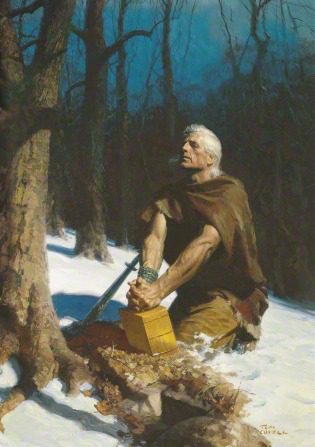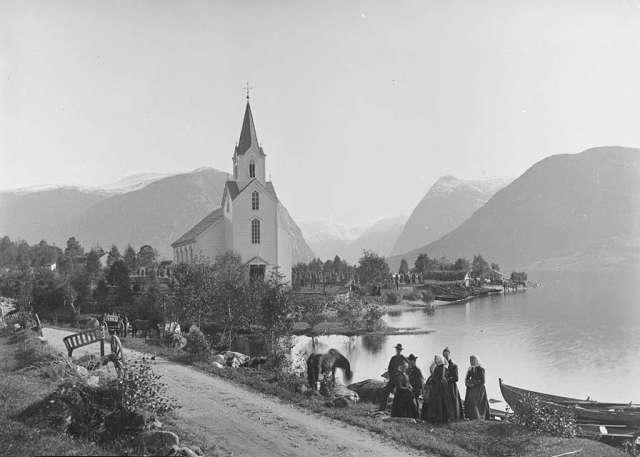
(Image from LDS.org)
Every once in a while, I encounter the claim from some former member of the Church of Jesus Christ of Latter-day Saints that leaders of the Church are quietly, gradually, stealthily moving Latter-day Saints toward acceptance of the notion that the Book of Mormon is merely “inspired” fiction of some sort. Perhaps an allegory. A parable.
Church leaders are being forced in this direction — so the reasoning typically goes — not only by the alleged lack of any and all evidence for the Book of Mormon’s historicity but by the steadily constricting noose of evidence against the Book’s historical authenticity.
I confess that I simply don’t see what such folks claim to be seeing. I don’t believe that decisive proof exists of the historicity of the Book of Mormon narrative, but I do believe that there is good evidence that strongly suggests the factual authenticity of the narrative contained in the Book. In fact, in dramatic contrast to the claim that lethal indicators of the Book’s supposedly fictional character are mounting rapidly and disastrously, I actually think that the Book of Mormon is in a stronger position now, as regards its historicity, than at any prior time since its appearance in the late 1820s and its first publication in English in 1830.
Moreover, I see absolutely no evidence that the Church and its leaders are subtly laying the groundwork for eventual abandonment of the claim that there were real Nephites, Lamanites, Mulekites, and Jaredites. Absolutely none. They aren’t moving in any way discernible to me in the direction, on this point, of the Community of Christ (formerly known as the Reorganized Church of Jesus Christ of Latter Day Saints).
Some who push the idea point in support of it to remarks that President Russell M. Nelson gave in 2016 to a group of new mission presidents and their wives. Among other things, he observed to them that “the Book of Mormon is not a book of history, although there is some history in it.” Says one recent critic, “That is a damning admission.”
It’s nothing of the sort.
Here is a quotation from a contemporary report of the meeting at which President Nelson spoke, “The Book of Mormon is a ‘miraculous miracle,’ says President Russell M. Nelson at 2016 Seminar for New Mission Presidents”:
“There are some things the Book of Mormon is not,” President Nelson said. “It is not a textbook of history, although some history is found within its pages. It is not a definitive work on ancient American agriculture or politics. It is not a record of all former inhabitants of the Western Hemisphere, but only of particular groups of people.”
Was he really saying that the Book of Mormon isn’t historical? Not at all. And, candidly, I think it a completely bone-headed misreading of his remarks — overeager, maybe, perhaps even disingenuous — to suggest that he was.
I think that I’ve established a pretty consistent public record as a believer in the genuine antiquity of the Book of Mormon, and as an advocate of that view of it. But I could say, and indeed have said, precisely the same thing about the Book of Mormon that President Nelson said in 2016. It isn’t merely “a textbook of history” — in the manner of, say, Emily Nussbaum’s Cue the Sun! The Invention of Reality TV, or Woosung Kang’s although it definitely employs history, which it presents as true history, as a vehicle for its genuine purpose:
Which is to show unto the remnant of the house of Israel what great things the Lord hath done for their fathers; and that they may know the covenants of the Lord, that they are not cast off forever—And also to the convincing of the Jew and Gentile that Jesus is the Christ, the Eternal God, manifesting himself unto all nations. (Title Page of the Book of Mormon)
Neither Cue the Sun! nor
And when ye shall receive these things, I would exhort you that ye would ask God, the Eternal Father, in the name of Christ, if these things are not true; and if ye shall ask with a sincere heart, with real intent, having faith in Christ, he will manifest the truth of it unto you, by the power of the Holy Ghost. . . .
And I exhort you to remember these things; for the time speedily cometh that ye shall know that I lie not, for ye shall see me at the bar of God; and the Lord God will say unto you: Did I not declare my words unto you, which were written by this man, like as one crying from the dead, yea, even as one speaking out of the dust? . . .
And God shall show unto you, that that which I have written is true.
And again I would exhort you that ye would come unto Christ, and lay hold upon every good gift, and touch not the evil gift, nor the unclean thing. . . .
Yea, come unto Christ, and be perfected in him, and deny yourselves of all ungodliness; and if ye shall deny yourselves of all ungodliness, and love God with all your might, mind and strength, then is his grace sufficient for you, that by his grace ye may be perfect in Christ; and if by the grace of God ye are perfect in Christ, ye can in nowise deny the power of God. . . .
And now I bid unto all, farewell. I soon go to rest in the paradise of God, until my spirit and body shall again reunite, and I am brought forth triumphant through the air, to meet you before the pleasing bar of the great Jehovah, the Eternal Judge of both quick and dead. Amen. (Moroni 10:4, 27, 29-30, 32, 34)
The Book of Mormon isn’t merely a history any more than the four New Testament gospels are “only” history. In his “New Translation” of the Bible, the Prophet Joseph Smith insightfully and significantly retitled Matthew, Mark, Luke, and John the “Testimony of Matthew,” the “Testimony of Mark,” the “Testimony of Luke,” and the “Testimony of John.” And that is exactly what they are. Historical, yes. But not merely history. When Sister Jones or Brother Smith shares a personal experience with a remarkable answer to prayer or with a time of great spiritual challenge, he or she isn’t merely passing on autobiographical details. There is a spiritual point to the narrative. Just as there is in the Gospel of John:
And many other signs truly did Jesus in the presence of his disciples, which are not written in this book:
But these are written, that ye might believe that Jesus is the Christ, the Son of God; and that believing ye might have life through his name. (John 20:30-31)
John’s goal wasn’t to record all of the facts about an interesting historical personality. Indeed, there is scarcely anything in John or in any of the canonical Gospels about Jesus’s infancy, childhood, adolescence, or early adulthood. There is very little biographical material in John’s Gospel prior to the three years of Christ’s mortal ministry; the final week of Jesus’s life takes up approximately forty percent of John’s text. He included the history that he needed to fulfill the purpose of his writing, which wasn’t to satisfy mere historical curiosity. Here is the very last verse of the Gospel of John:
And there are also many other things which Jesus did, the which, if they should be written every one, I suppose that even the world itself could not contain the books that should be written. Amen. (John 31:25)

Also from the Deseret News: “Superman and the secular longing for a Savior: The Jewish creators of Superman were not focused on Jesus. So why has this superhero become so widely embraced as a Christ-like symbol?”
My grandmother was Norwegian, but she emigrated to North Dakota at about eighteen years of age for largely economic reasons and she remained a Lutheran throughout her entire life. Still, I was interested to see this: “Latter-day Saints in Norway Honour Pioneer Legacy and Mark 200 Years of Norwegian Emigration: Church members participate in national events honouring the historic 1825 voyage of the sloop ‘Restauration’ and its lasting legacy for Norway and the Church” I love Norway, and I’ve traveled a fair amount there.
I got a kick out of this: “Pope Leo XIV was at the 2005 World Series.” I wonder how any of those sitting in the bleachers around him, cheering and eating hot dogs, would have reacted to the suggestion that The White Sox Fan Over There would someday be the Pope.
Posted from Helena, Montana










